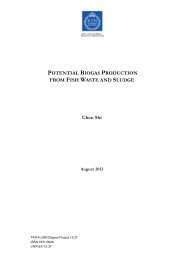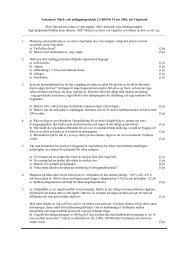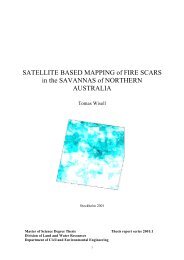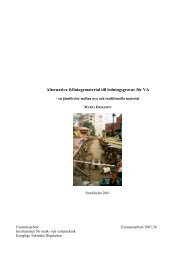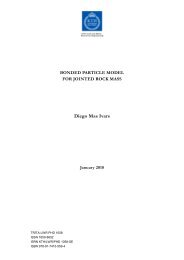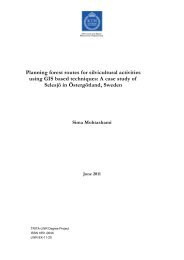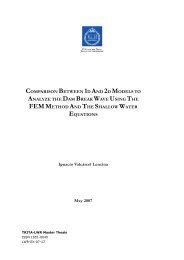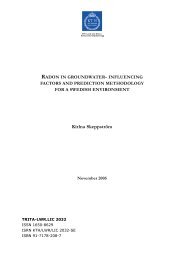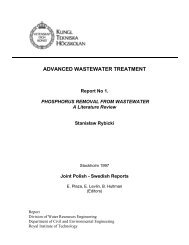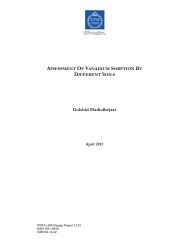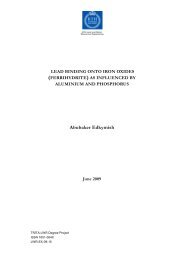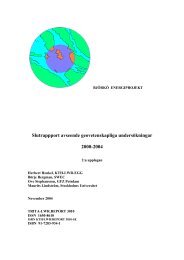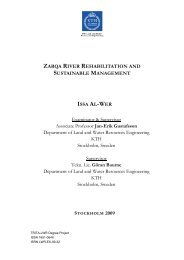water sources, infrastructure, space and the dynamics of ...
water sources, infrastructure, space and the dynamics of ...
water sources, infrastructure, space and the dynamics of ...
You also want an ePaper? Increase the reach of your titles
YUMPU automatically turns print PDFs into web optimized ePapers that Google loves.
Mat<strong>the</strong>w Biniyam KursahTRITA LWR Master ThesisWater management: traditional value system <strong>and</strong> <strong>the</strong> modern positivismLike most parts in Ghana during <strong>the</strong> period <strong>of</strong> low population growth<strong>and</strong> localisation <strong>of</strong> <strong>water</strong> re<strong>sources</strong> as well as market, <strong>the</strong> intergenerationalequity was <strong>and</strong> could be safeguarded in Saboba district. Thiswas sustained by <strong>the</strong> traditional management practices <strong>of</strong> <strong>the</strong> use <strong>of</strong><strong>water</strong> re<strong>sources</strong>. Quite <strong>of</strong>ten, <strong>the</strong> socio-cultural ideologies <strong>and</strong>philosophies mostly inclined on cultures were been used for <strong>the</strong>protection <strong>of</strong> <strong>water</strong> which was considered sacred in <strong>the</strong> district. Theseindigenous strategies are usually predicated on customs <strong>and</strong> traditionsthat have strong totemic significance, as <strong>the</strong>y were h<strong>and</strong>ed-down fromancestral lineages (Benneh et al, 1998 <strong>and</strong> Toulmin et al, 2002). It isinteresting to note that those norms were more respected <strong>and</strong> compliedwith in <strong>the</strong> communities within <strong>the</strong> district due largely to <strong>the</strong>irapprehensive consequences. Some management strategies included <strong>the</strong>use <strong>of</strong> moral laws <strong>and</strong> taboos, restrictions, adherence to religious beliefs<strong>and</strong> sometimes outright ban-on-use <strong>of</strong> certain sections/whole <strong>of</strong> <strong>water</strong>body when its vulnerability to contamination seems imminent. Some<strong>water</strong> <strong>and</strong> o<strong>the</strong>r natural re<strong>sources</strong> were been deified. Thus, like <strong>the</strong> biblicalprohibitions thy shall not or taboos, were enshrined in <strong>the</strong> value systemsto control <strong>the</strong> use <strong>of</strong> environment that will have health repercussions onpeople. Within <strong>the</strong> district for example, one was forbidden to send acooking pot (usually dirty) to riverside or cut vegetation along rivervalleys. The rationale was to reduce <strong>water</strong> pollution <strong>and</strong> siltation as aresult <strong>of</strong> downstream erosion <strong>of</strong> river/stream courses, respectively.Offenders were seen as invoking <strong>the</strong> spirits <strong>of</strong> limoawaal (river-gods)which will punish <strong>the</strong>m accordingly, hence giving credence to <strong>the</strong> view <strong>of</strong>Nana Ofori Atta II.However, <strong>the</strong> incorporation <strong>of</strong> <strong>the</strong> district, like any part in Ghana, into<strong>the</strong> modern system, decentralisation policy, rapid population growth,changes in socio-economic conditions <strong>and</strong> lifestyle have led to <strong>the</strong>relegation <strong>of</strong> <strong>the</strong>se traditional management practices <strong>of</strong> <strong>the</strong> use <strong>of</strong> <strong>water</strong>.Thus, <strong>the</strong> use <strong>of</strong> <strong>water</strong> re<strong>sources</strong> in <strong>the</strong> district is now largely governedby <strong>the</strong> modern positivist view <strong>of</strong> <strong>the</strong> relationship between society <strong>and</strong>nature. The pr<strong>of</strong>it motive ra<strong>the</strong>r than <strong>the</strong> previous value systemsregulating <strong>water</strong> <strong>and</strong> environment control this current perspective view.The goal <strong>of</strong> positivism is to achieve objectivity in problem solving.Therefore, issues relating to <strong>the</strong> subjective world <strong>of</strong> value systems (suchas thy shall not or taboos) are now regarded as unscientific <strong>and</strong> hence notworth exploring (Kendie, 1997). In most cases <strong>the</strong>se are seen as obstaclesto be eliminated (Goulet, 1986). The ordinary person can now use <strong>water</strong>re<strong>sources</strong> <strong>and</strong> vegetation along it without any control by ei<strong>the</strong>rtraditional authority or District Assembly. As one respondent fromBordagbalm echoed; “d<strong>and</strong>ana aabiim aah ki pak iiyaajakaar” (<strong>the</strong> youth <strong>of</strong>today don’t longer respect ancestral laws).Currently, management <strong>and</strong> protection <strong>of</strong> <strong>water</strong> re<strong>sources</strong> is one <strong>of</strong> <strong>the</strong>least concerns in <strong>the</strong> district. Water is left to suffer <strong>the</strong> Hardin’s Tragedy <strong>of</strong><strong>the</strong> Common syndrome, as a woman respondent stated if clo<strong>the</strong>s are dirty, weuse <strong>water</strong> to wash it. So, Karaachi (intellectual) what can be used to wash <strong>water</strong> too?(my translation). Illiteracy <strong>and</strong> total lack <strong>of</strong> health concerns play a criticalrole in this case. As a result, <strong>the</strong> traditional norms <strong>and</strong> value systemsgoverning <strong>the</strong> relationship between nature <strong>and</strong> society have beenreplaced in <strong>the</strong> district by <strong>the</strong> modern positivist view. However, modernpositivism has not been able to adopt adequate practices <strong>and</strong> methods tosustain <strong>water</strong> re<strong>sources</strong>. The effect <strong>of</strong> this changing perception onenvironment, <strong>and</strong> specifically <strong>water</strong> use, has contributed to a20



